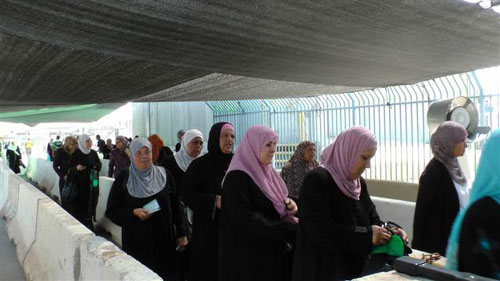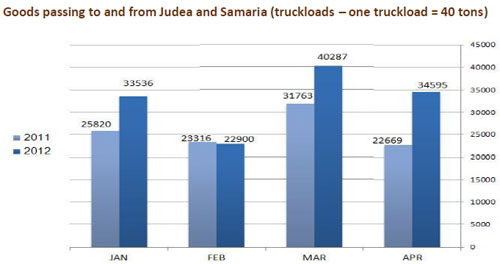1. Slowdown in economic growth, and budget difficulties -
The growth rate of the Palestinian economy in Judea and Samaria slowed down in
2011, remaining at 5.2% (according to the Palestinian Central Bureau of
Statistics). The slowdown was apparently the result of the budget crisis
experienced by the Palestinian Authority (PA) due to a decrease in international
aid, difficulty in getting additional loans from local banks to pay off its
deficit, and a lack of increase in local tax revenues. In light of the PA's
budget crisis, Israel transferred at the beginning of the month of Ramadan (27
July) an advance of NIS 180 million (approximately USD 45 million) of August tax
remittances. The money was intended to help the PA pay salaries in time to
celebrate the holiday.
2. Arrangements regarding transfer of goods and related tax
procedures - On 31 July, Israel and the PA concluded arrangements with
respect to the transfer of goods between Israel and the PA and related tax
procedures. The arrangements were based on previous economic agreements, in
particular the Paris Protocol. The arrangements include the accurate calculation
of taxes based on the actual transfer of goods (as opposed to the reported
transfer of goods in the current practice), the establishment of a bonded
facility in the West Bank, a shared online data base for information on the
import of goods, and laying a fuel pipeline between Israel and the PA. These
steps will deepen the trade relations between Israel and the PA, and help both
sides fight smuggling and tax evasion. The measures, which were recommended by
the International Monetary Fund, will improve the PA's tax system, increase
revenues and bolster the economy. Implementation will begin on 1 January 2013
and will be accompanied by a team of experts from both sides which is currently
being assembled.
3. Facilitation of the movement of people and goods
• The
number of roadblocks was reduced from 44 in 2008 to 10 in 2012, most of which
are normally open. The most recent roadblock to be removed, in the last two
weeks, was roadblock 328 north of Jericho, connecting Jericho to Highway
90.
• The infrastructures at the goods crossings and at the Allenby Bridge
between Israel and Jordan were upgraded and hours of operation extended. The
bridge was kept open for 48 hours straight at the beginning of Ramadan to enable
the passage of more than 25,000 visitors.
• About 20% more entry permits to
Israel were granted during 2012 compared to the similar period last year.


Qalandiya
crossing during Ramadan 2012 (Photo: COGAT)
4. Increase of workers allowed into Israel - On 14 July,
5,000 additional work permits were approved for Palestinian construction workers
to work in Israel.
5. Increase of Palestinian imports/exports - Palestinian
exports to Israel in 2011 increased by 18.3% compared to 2010. There was an
increase of 33% in the passage of goods through the Allenby Bridge. Palestinian
exports (excluding Israel) grew by 13% in 2011. Also Palestinian imports
(excluding Israel) grew by 9.3% in 2011 compared to 2010. In 2011 the number of
permits for agricultural imports in Judea and Samaria was increased by 12% and
814 licenses for agricultural imports were granted, compared to 725 in 2010. In
addition, a meeting took place a few months ago between the head of the Israeli
customs authority and his Palestinian counterpart together with a group of
leading Palestinian importers and exporters. They discussed ways to remove
obstacles to increasing Palestinian foreign trade.


Source: COGAT
6. Development of energy sources in the PA - Israel agreed
in principle to discuss the Palestinian request to develop the gas field near
the Gaza coast. A dialogue on the subject is being conducted between Israel and
the PA.
7. Agreement to build power substations - In February 2012,
an agreement was signed between the Israel Electric Company and the Palestinian
Energy Authority for the construction of four substations for the production of
electricity in the West Bank. This will significantly boost the amount of
available electricity in the area.
8. Approval of projects in Area C - Israel is promoting
infrastructure projects in Area C, including completion of a master plan.
Fifteen projects relating to the construction and renovation of infrastructures
for schools and clinics have received "fast-track" approval (especially UN
projects and projects on the Blair List). In 2011, 119 infrastructure projects
were approved, 58 of them with international financing (out of 78 requests that
were submitted - 74%).. Sixty-one locally-funded projects were approved and 29
additional requests are in various stages of examination and approval. Out of
the total projects approved (119), 57 have been completed, five are in various
stages of building, and 43 projects have not yet been implemented due to lack of
funds (Israel is offering these projects to the international community to
finance immediate building).
9. Development of economic projects with international
support - Israel is cooperating with Quartet envoy Tony Blair and UN
envoy Robert Serry as well as with representatives of governments and other
organizations with the goal of advancing economic projects in the PA. Some
examples:
• French initiative to develop an industrial park in
Bethlehem.
• German project to build a sewage treatment plant and to lay a
sewage pipe in Tul Karem.
• Japanese project to develop an agro-industrial
part in Jericho.
• Dutch donation of a container scanner to be installed at
the Allenby Bridge.
• World Bank project to build a sewage treatment plant in
Hebron.
10. Reinforcing governance ability - Israel continues to
support the bolstering of the PA's ability to govern and is aiding the
development of administrative infrastructures in the spheres of security, law,
the economy and the Palestinian banking system. Since 2007, the Ministries of
Finance have been cooperating on such topics as the monthly transfer of customs
intakes and working meetings of professional teams. In 2011, there was an
increase of 5.9% in customs intakes transferred to the PA.
11. Cooperation in banking and monetary subjects - The Bank
of Israel works in cooperation with the Palestinian Monetary Authority (PMA) to
strengthen monetary and banking cooperation between the economies, subject to
security constraints, international laws concerning the financing of terrorist
activities, and international professional standards.